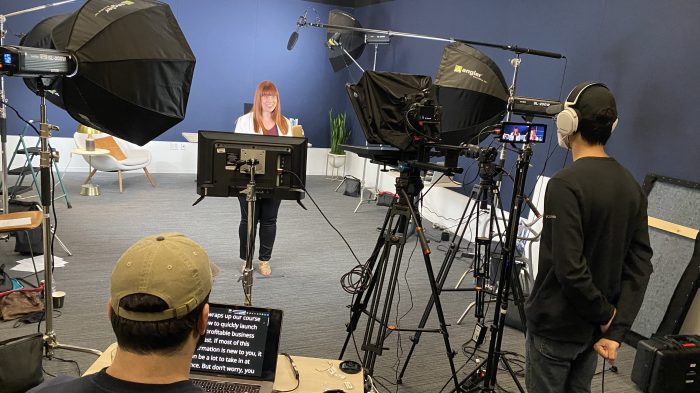
Balancing a full-time job with your podcasting passion can be a challenging yet rewarding experience. While it may seem daunting to juggle the demands of a regular job and the commitment required to create a successful podcast, it is entirely possible with the right strategies and mindset.
Tip #1: Set Realistic Goals and Expectations
When juggling a full-time job and a podcast, setting realistic goals and expectations keeps your efforts sustainable. Podcasting can be time-consuming, and it’s easy to underestimate the effort required to produce high-quality content consistently.
But, when you break down your podcasting tasks into smaller, manageable steps, you can make full use of your time outside of work. This lets you start and complete a task after work depending on how much time you have. Even better, set time estimates for each broken-down task and then choose tasks based on the amount of time you have.
Tip #2: Stick to Your Schedule
One of the most important aspects of balancing podcasting with a full-time job is creating a consistent schedule. Consistency helps you build momentum, establish a routine, and manage your time effectively. It also helps your audience know when to expect new episodes, fostering loyalty and engagement.
Here are a few strategies to help you stick to a consistent schedule:
- Identify When You Can Work on Podcasting: Choose a specific day and time that you can consistently dedicate to podcasting, such as early mornings, lunch breaks, or weekends.
- Commit to Time Blocks: Treat the time you choose to dedicate to podcasting as non-negotiable appointments with yourself, just as you would with important work meetings or deadlines.
- Use a Content Calendar: Create a content calendar to plan your episodes in advance, ensuring a steady flow of content and reducing stress.
Tip #3: Optimize Your Workflow
By optimizing your workflow, you can streamline your content creation process, saving time and energy without compromising quality. Start by developing a standardized process for each stage of podcast production. Break down the tasks involved in creating an episode, from ideation to publication, and create a checklist or standard operating procedure (SOP) to follow. Then, start creating templates for each step in your checklist so you can get down to business quicker.
Batching tasks together can help you make the most of your time as well. Instead of switching between different tasks throughout the week, dedicate specific blocks of time to focus on one aspect of production at a time. For example, spend one block of time researching and outlining multiple episodes, another block bulk-recording those episodes, and another editing and post-processing them.
Tip #4: Leverage Time-Saving Tools and Resources
Every minute counts when trying to balance the responsibilities of a full-time job while creating a whole podcast. Using all of the tools and resources at your disposal can help you make the most of your time. You might even be able to automate a few of those pesky tasks that eat up major portions of your time.
Figuring out where to start when looking for tools that can save you time feels like finding the needle in a haystack. So, let’s give a quick rundown of popular tools that podcasters use to work more efficiently:
- Remote Recording Platforms: With a remote recording platform, you can record your podcasts from anywhere letting you capitalize on every free moment. Get started remote recording with Zencastr, Squadcast, or Riverside.fm.
- Social Media Scheduling Tools: If promoting your podcast on social media takes up too much of your time, you can automate a lot of those tasks and schedule posts months in advance. Tools like Hootsuite, Buffer, Sprout Social, and Later let you batch your social media work so you can set it and forget it.
- Transcription Services: Creating transcriptions for your podcast can bring a lot of benefits, but it also takes a lot of time. Well, you can outsource or automate this work for pretty cheap using resources like Rev, Trint, or Descript.

Tip #5: Collaborate and Outsource
Creating a successful podcast while working a full-time job can be overwhelming, but you don’t have to do it all alone. Collaborating with others and outsourcing certain tasks can help lighten your workload, bring fresh perspectives to your content, and allow you to focus on the aspects of podcasting that you enjoy most. You can go all in on collaboration by co-hosting a podcast with a partner or just step your toes in it by regularly featuring guests on your show.
On top of collaborating with other podcasters, you can also outsource some of your work. Even though it means you’ll need to shell out a few dollars, having a bit of a budget for your show is one of the perks of working a full-time job while making a podcast. Take that leeway to hire a virtual assistant or outsource your editing to a pro. Regardless of which tasks you choose to outsource, taking a few things off your plate will help.
Tip #6: Prioritize Self-Care and Avoid Burnout
It’s easy to get caught up in the hustle and neglect your well-being. But, prioritizing self-care and avoiding burnout is crucial for maintaining a sustainable and enjoyable podcasting journey.
Setting boundaries should be your first step in avoiding burnout. Determine the amount of time and energy you can realistically dedicate to your podcast without compromising your health, relationships, or job performance. Be honest with yourself about your limits, and learn to say no when necessary.
Protecting your personal time is equally important. Set aside dedicated time for rest, relaxation, and activities that bring you joy outside of work and podcasting. Whether it’s spending time with loved ones, pursuing a hobby, or simply taking a break to recharge, make sure to carve out space for yourself in your schedule. And always remember, your well-being should always be at the top of your priority list.
Conclusion
As a podcaster with a full-time job, you have the advantage of a stable income and the ability to pursue your creative endeavors without the pressure of relying on your podcast for financial support. But, it also means you have limited time to work on your passion. Even though building a thriving podcast takes time, effort, and patience, you can still do both! So, take advantage of the stability your full-time job gives you while making the most of the time you can put toward your podcasting dreams.









